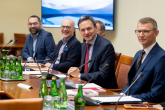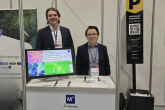ICM UW in the international consortium MOSAIC

Fifteen institutions from seven countries – France, Poland, Portugal, Kenya, Brazil, the USA, and Colombia – will implement the MOSAIC project starting from the new year. The project focuses on open, multimodal, and replicable information ecosystems supporting cross-border communities. MOSAIC is simultaneously the first initiative in Poland under the ‘Horizon Europe’ framework that addresses environmental aspects of epidemiological threats. The project task for ICM UW is to prepare data infrastructure and software for stakeholders.
The project, titled “Multi-site application of Open Science in the creAtion of healthy environments Involving local Communities (MOSAIC),” secured funding from the European Union’s Horizon Europe framework program: Environment and health – Planetary health (HORIZON-HLTH-2023-ENVHLTH-02-01) and is set to be implemented over four years starting from January 1, 2024.
The international consortium is led by the French institute IRD (Institut de Recherche pour le Développement), with a total of 15 institutions from 7 countries: France, Poland, Portugal, Kenya, Brazil, the USA, and Colombia. In Poland, the project is implemented by the Interdisciplinary Centre for Mathematical and Computational Modelling at the University of Warsaw (ICM UW), under the direction of Dr. Aneta Afelt, in collaboration with the IT team led by Łukasz Dumiszewski. Within the international research team, ICM UW is responsible for data management.
MOSAIC is the first project in Poland under the ‘Horizon Europe’ program to address environmental aspects of epidemiological threats.
“When I started working with local communities ten years ago – training local public health workers in Cambodia, Laos, and Indonesia to use simple spatial analysis tools and report unusual illnesses – a project like MOSAIC was a dream of integrating scientific achievements and their intended beneficiaries. Even then, rich spatial data on the quality of the natural environment, computational capabilities, defining and creating specialized databases were not integrated and utilized in the daily practices of local epidemiological services in developing countries. Also, in science, the integration and transdisciplinary approach to creating and interpreting data sets from many, often unrelated disciplines, were not obvious.
I remember the critical view of applying geographic analysis methods in the concept of One Health – it’s just a map! What’s new in this? Today, the One Health concept is already a well-established paradigm in which Earth and environmental sciences have their obvious representation. I am very pleased that our MOSAIC project will also be implemented in Poland, including us in one of the most important current research trends – the relationship between the environment, humans, and health,” comments Dr. Aneta Afelt from ICM UW, the coordinator of the MOSAIC project in Poland.
MOSAIC – Multi-site application of Open Science in the creation of healthy environments Involving local Communities
Horizon Europe, HORIZON-HLTH-2023-ENVHLTH-02: Environment and health
Planetary health: understanding the links between environmental degradation and health impacts
Text: Dr. Aneta Afelt, ICM UW
The development of remote techniques for acquiring large amounts of data on the qualitative and quantitative characteristics of the Earth’s environment, combined with the continually growing analytical capabilities and computational power of modern supercomputers, is one of the decisive factors for the dynamic development of interdisciplinary research on the relationships between the conditions of the natural environment and the quality of our health. The necessity of a systemic approach to epidemiological threats arising from the diversity of human living conditions, as well as equivalently – conditions for food production and the associated transformation of the Earth’s natural ecosystem, has been a research demand for many years. However, it gained particular significance in the last three years as we globally grapple with the pandemic of the SARS-CoV-2 animal-origin virus.
The pandemic, impacting many areas of our daily life, simultaneously pointed to our scientific limitations, primarily in the prediction of epidemiological threats; both at the local level – crucial for the comfort of local communities, and at the global level – influencing the redistribution of economic resources and, as research results indicate, widening the economic gap between societies.
Current research results on the planet still do not provide a comprehensive understanding of the interactions (consequences and benefits) between environmental changes, its degradation, and health – this applies to all levels of planetary health. The MOSAIC project is one of the six selected for implementation under Horizon Europe, Environment, and health – Planetary health. The common goal of the selected projects is to seek optimal methods and tools to support communities in building resilience to changing conditions on the planet (such as threats arising from climate change, exploitation of natural resources, or a drastic decline in biodiversity and the global standardization of socio-ecological systems).






In the photos, transboundary areas of Southeast Asia; private archive of Dr. Aneta Afelt.
The MOSAIC project is dedicated to collaboration with local communities in low- and middle-income countries living in transboundary areas, grappling with the negative impacts of environmental changes and degradation affecting their health and well-being. It also considers the unique socio-political contexts that increase their vulnerability to threats. MOSAIC recognizes that these populations may be better adapted to interpret and use complex and multi-themed information about their environment to identify and understand the environmental impact on their well-being. Key to this is the recognition and implementation of locally feasible, acceptable, and sustainable adaptive solutions. Unfortunately, local communities may not necessarily possess the required scientific skills to fully benefit from them. MOSAIC aims to design and implement open, multimodal, and replicable information ecosystems that support transboundary communities in: i) understanding the environmental impact on their well-being, ii) building a health-promoting environment, iii) influencing public debate, public policy, and public decisions.
MOSAIC is based on the principles of open science, allowing: i) participatory and data sciences to collaborate with multiple disciplines and stakeholders, ii) scientists and society to co-create and utilize data and knowledge, guided by common values.
Two bioregions particularly affected by climate change, extreme weather events, and land cover degradation have been selected for collaboration: East Africa and the Amazon, with three transboundary research areas as “laboratories.” Direct collaboration with local communities will enable the implementation and evaluation of project development, testing of reproducibility and reuse of methods, data, and tools, and facilitating inter- and trans disciplinarity through the joint mobilization of a multidisciplinary team.

Funded by the European Union. Views and opinions expressed are however those of the author(s) only and do not necessarily reflect those of the European Union or European Health and Digital Executive Agency. Neither the European Union nor the granting authority can be held responsible for them.











